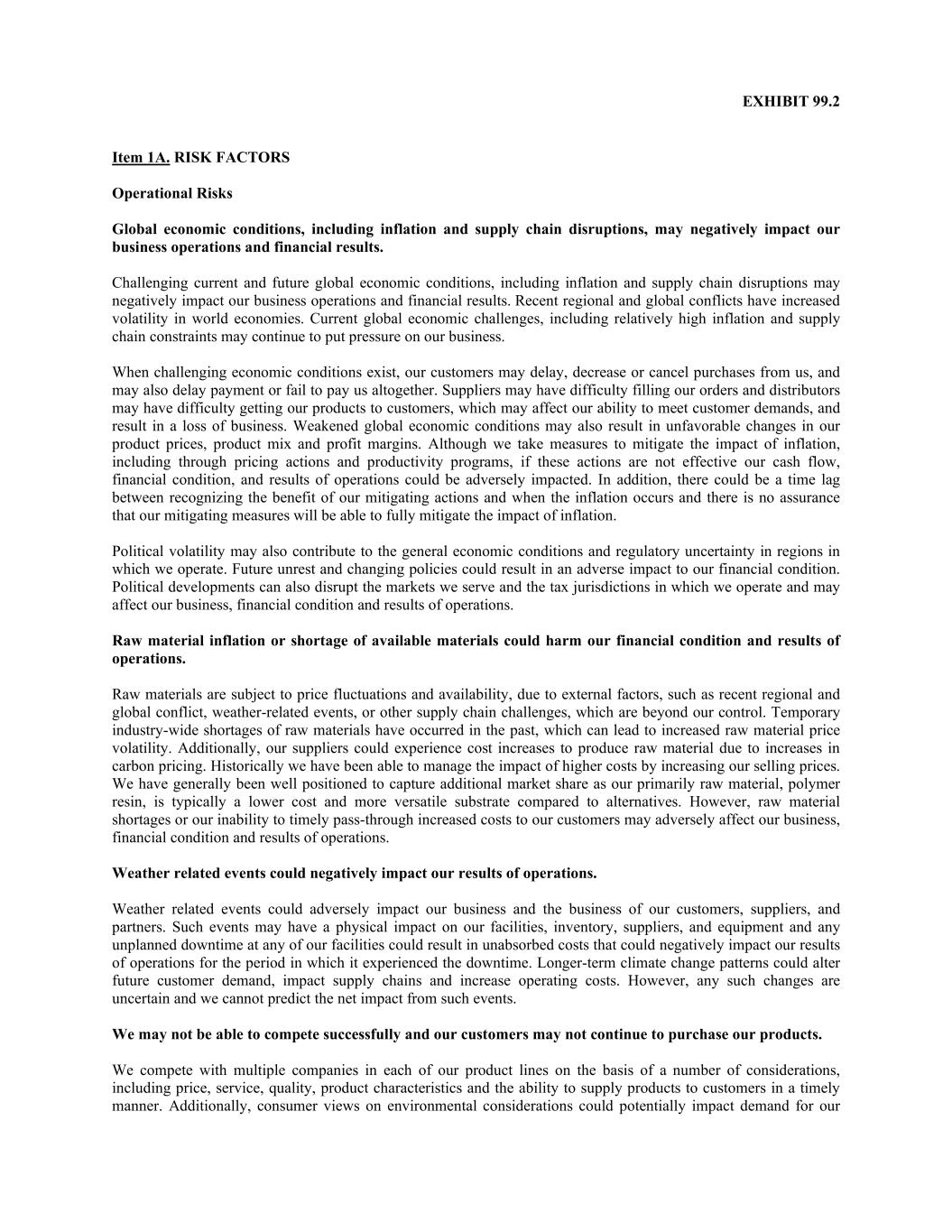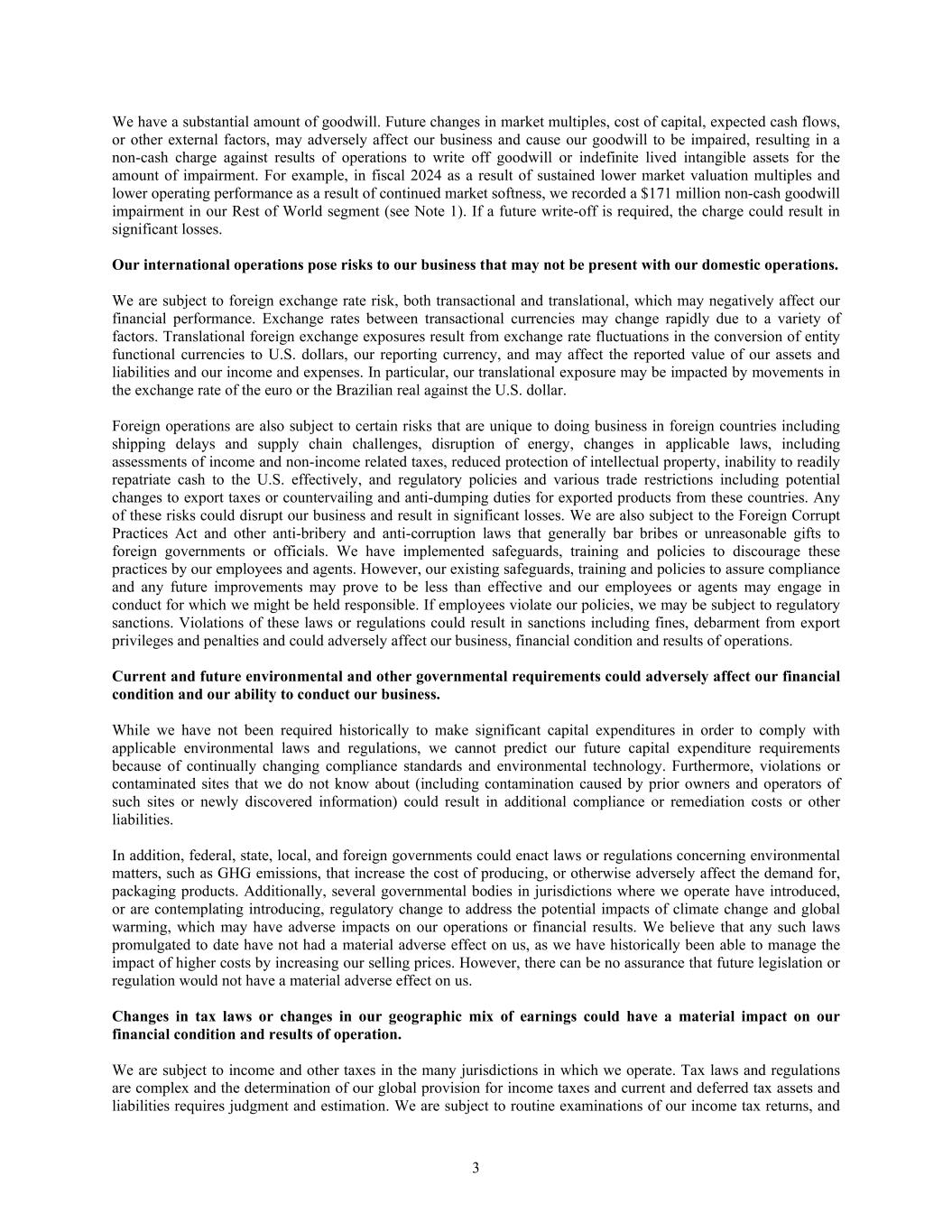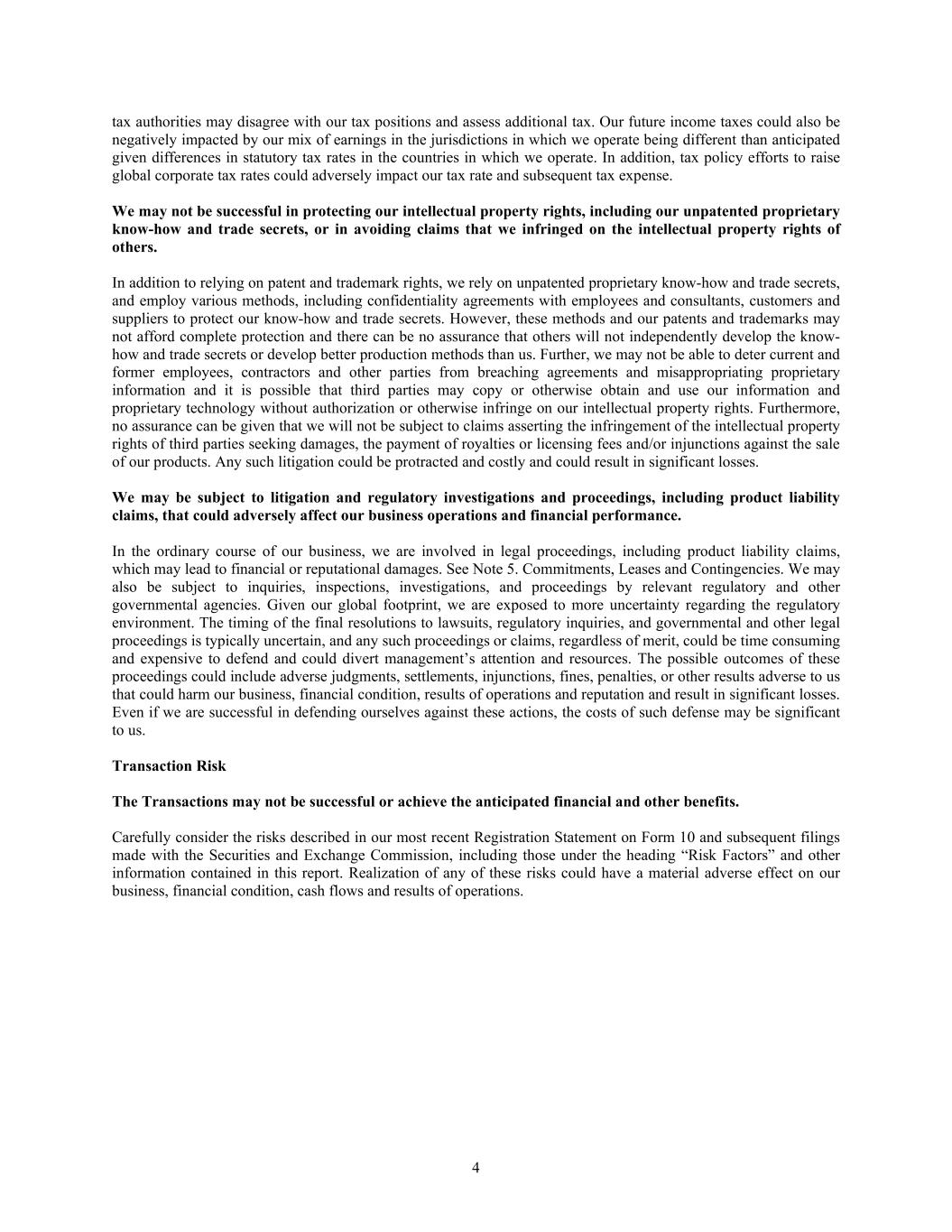
EXHIBIT 99.2 Item 1A. RISK FACTORS Operational Risks Global economic conditions, including inflation and supply chain disruptions, may negatively impact our business operations and financial results. Challenging current and future global economic conditions, including inflation and supply chain disruptions may negatively impact our business operations and financial results. Recent regional and global conflicts have increased volatility in world economies. Current global economic challenges, including relatively high inflation and supply chain constraints may continue to put pressure on our business. When challenging economic conditions exist, our customers may delay, decrease or cancel purchases from us, and may also delay payment or fail to pay us altogether. Suppliers may have difficulty filling our orders and distributors may have difficulty getting our products to customers, which may affect our ability to meet customer demands, and result in a loss of business. Weakened global economic conditions may also result in unfavorable changes in our product prices, product mix and profit margins. Although we take measures to mitigate the impact of inflation, including through pricing actions and productivity programs, if these actions are not effective our cash flow, financial condition, and results of operations could be adversely impacted. In addition, there could be a time lag between recognizing the benefit of our mitigating actions and when the inflation occurs and there is no assurance that our mitigating measures will be able to fully mitigate the impact of inflation. Political volatility may also contribute to the general economic conditions and regulatory uncertainty in regions in which we operate. Future unrest and changing policies could result in an adverse impact to our financial condition. Political developments can also disrupt the markets we serve and the tax jurisdictions in which we operate and may affect our business, financial condition and results of operations. Raw material inflation or shortage of available materials could harm our financial condition and results of operations. Raw materials are subject to price fluctuations and availability, due to external factors, such as recent regional and global conflict, weather-related events, or other supply chain challenges, which are beyond our control. Temporary industry-wide shortages of raw materials have occurred in the past, which can lead to increased raw material price volatility. Additionally, our suppliers could experience cost increases to produce raw material due to increases in carbon pricing. Historically we have been able to manage the impact of higher costs by increasing our selling prices. We have generally been well positioned to capture additional market share as our primarily raw material, polymer resin, is typically a lower cost and more versatile substrate compared to alternatives. However, raw material shortages or our inability to timely pass-through increased costs to our customers may adversely affect our business, financial condition and results of operations. Weather related events could negatively impact our results of operations. Weather related events could adversely impact our business and the business of our customers, suppliers, and partners. Such events may have a physical impact on our facilities, inventory, suppliers, and equipment and any unplanned downtime at any of our facilities could result in unabsorbed costs that could negatively impact our results of operations for the period in which it experienced the downtime. Longer-term climate change patterns could alter future customer demand, impact supply chains and increase operating costs. However, any such changes are uncertain and we cannot predict the net impact from such events. We may not be able to compete successfully and our customers may not continue to purchase our products. We compete with multiple companies in each of our product lines on the basis of a number of considerations, including price, service, quality, product characteristics and the ability to supply products to customers in a timely manner. Additionally, consumer views on environmental considerations could potentially impact demand for our

2 products that utilize fossil fuel based materials in their manufacturing. Our competitors may have financial and other resources that are substantially greater than ours and may be better able than us to withstand higher costs. Competition and product preference changes could result in our products losing market share or our having to reduce our prices, either of which could have a material adverse effect on our business, financial condition and results of operations. In addition, since we do not have long-term arrangements with many of our customers, these competitive factors could cause our customers to shift suppliers quickly. We may pursue and execute acquisitions or divestitures, which could adversely affect our business. As part of our growth strategy, we consider transactions that either complement or expand our existing business and create economic value. Transactions involve special risks, including the potential assumption of unanticipated liabilities and contingencies as well as difficulties in integrating acquired businesses or carving-out divested businesses, which may result in substantial costs, delays or other problems that could adversely affect our business, financial condition and results of operations. Furthermore, we may not realize all of the synergies we expect to achieve from our current strategic initiatives due to a variety of risks. If we are unable to achieve the benefits that we expect to achieve from our strategic initiatives, it could adversely affect our business, financial condition and results of operations. In the event of a catastrophic loss of one of our key manufacturing facilities, our business would be adversely affected. While we maintain insurance covering our facilities, including business interruption insurance, a catastrophic loss of the use of all or a portion of one of our key manufacturing facilities due to accident, labor issues, weather conditions, natural disaster, pandemic or otherwise, whether short or long-term, could result in future losses. Employee retention or labor cost inflation could disrupt our business. Our relations with employees under collective bargaining agreements remain satisfactory and there have been no significant work stoppages or other labor disputes during the past four years. However, we may not be able to maintain constructive relationships with labor unions or trade councils and may not be able to successfully negotiate new collective bargaining agreements on satisfactory terms in the future. Labor is subject to cost inflation, availability and workforce participation rates, all of which could be impacted by factors beyond our control. As a result, there can be no assurance we will be able to recruit, train, assimilate, motivate and retain employees in the future. The loss of a substantial number of these employees or a prolonged labor dispute could disrupt our business and result in future losses. We depend on information technology systems and infrastructure to operate our business, and increased cybersecurity threats, system inadequacies, and failures could disrupt our operations, compromise customer, employee, vendor and other data which could negatively affect our business. We rely on the efficient and uninterrupted operation of information technology systems and networks. These systems and networks are vulnerable to increased threats and more sophisticated computer crime, energy interruptions, telecommunications failures, breakdowns, natural disasters, terrorism, war, computer malware or other malicious intrusions. We also maintain and have access to data and information that is subject to privacy and security laws, regulations, and customer controls. Despite our efforts to protect such information, breaches, misplaced or lost data and programming damages could result in a negative impact on the business. While we have not had material system interruptions historically associated with these risks, there can be no assurance from future interruptions that could result in future losses. Financial and Legal Risks Goodwill and other intangibles represent a significant amount of our net worth, and a future write-off could result in lower reported net income and a reduction of our net worth.

3 We have a substantial amount of goodwill. Future changes in market multiples, cost of capital, expected cash flows, or other external factors, may adversely affect our business and cause our goodwill to be impaired, resulting in a non-cash charge against results of operations to write off goodwill or indefinite lived intangible assets for the amount of impairment. For example, in fiscal 2024 as a result of sustained lower market valuation multiples and lower operating performance as a result of continued market softness, we recorded a $171 million non-cash goodwill impairment in our Rest of World segment (see Note 1). If a future write-off is required, the charge could result in significant losses. Our international operations pose risks to our business that may not be present with our domestic operations. We are subject to foreign exchange rate risk, both transactional and translational, which may negatively affect our financial performance. Exchange rates between transactional currencies may change rapidly due to a variety of factors. Translational foreign exchange exposures result from exchange rate fluctuations in the conversion of entity functional currencies to U.S. dollars, our reporting currency, and may affect the reported value of our assets and liabilities and our income and expenses. In particular, our translational exposure may be impacted by movements in the exchange rate of the euro or the Brazilian real against the U.S. dollar. Foreign operations are also subject to certain risks that are unique to doing business in foreign countries including shipping delays and supply chain challenges, disruption of energy, changes in applicable laws, including assessments of income and non-income related taxes, reduced protection of intellectual property, inability to readily repatriate cash to the U.S. effectively, and regulatory policies and various trade restrictions including potential changes to export taxes or countervailing and anti-dumping duties for exported products from these countries. Any of these risks could disrupt our business and result in significant losses. We are also subject to the Foreign Corrupt Practices Act and other anti-bribery and anti-corruption laws that generally bar bribes or unreasonable gifts to foreign governments or officials. We have implemented safeguards, training and policies to discourage these practices by our employees and agents. However, our existing safeguards, training and policies to assure compliance and any future improvements may prove to be less than effective and our employees or agents may engage in conduct for which we might be held responsible. If employees violate our policies, we may be subject to regulatory sanctions. Violations of these laws or regulations could result in sanctions including fines, debarment from export privileges and penalties and could adversely affect our business, financial condition and results of operations. Current and future environmental and other governmental requirements could adversely affect our financial condition and our ability to conduct our business. While we have not been required historically to make significant capital expenditures in order to comply with applicable environmental laws and regulations, we cannot predict our future capital expenditure requirements because of continually changing compliance standards and environmental technology. Furthermore, violations or contaminated sites that we do not know about (including contamination caused by prior owners and operators of such sites or newly discovered information) could result in additional compliance or remediation costs or other liabilities. In addition, federal, state, local, and foreign governments could enact laws or regulations concerning environmental matters, such as GHG emissions, that increase the cost of producing, or otherwise adversely affect the demand for, packaging products. Additionally, several governmental bodies in jurisdictions where we operate have introduced, or are contemplating introducing, regulatory change to address the potential impacts of climate change and global warming, which may have adverse impacts on our operations or financial results. We believe that any such laws promulgated to date have not had a material adverse effect on us, as we have historically been able to manage the impact of higher costs by increasing our selling prices. However, there can be no assurance that future legislation or regulation would not have a material adverse effect on us. Changes in tax laws or changes in our geographic mix of earnings could have a material impact on our financial condition and results of operation. We are subject to income and other taxes in the many jurisdictions in which we operate. Tax laws and regulations are complex and the determination of our global provision for income taxes and current and deferred tax assets and liabilities requires judgment and estimation. We are subject to routine examinations of our income tax returns, and

4 tax authorities may disagree with our tax positions and assess additional tax. Our future income taxes could also be negatively impacted by our mix of earnings in the jurisdictions in which we operate being different than anticipated given differences in statutory tax rates in the countries in which we operate. In addition, tax policy efforts to raise global corporate tax rates could adversely impact our tax rate and subsequent tax expense. We may not be successful in protecting our intellectual property rights, including our unpatented proprietary know-how and trade secrets, or in avoiding claims that we infringed on the intellectual property rights of others. In addition to relying on patent and trademark rights, we rely on unpatented proprietary know-how and trade secrets, and employ various methods, including confidentiality agreements with employees and consultants, customers and suppliers to protect our know-how and trade secrets. However, these methods and our patents and trademarks may not afford complete protection and there can be no assurance that others will not independently develop the know- how and trade secrets or develop better production methods than us. Further, we may not be able to deter current and former employees, contractors and other parties from breaching agreements and misappropriating proprietary information and it is possible that third parties may copy or otherwise obtain and use our information and proprietary technology without authorization or otherwise infringe on our intellectual property rights. Furthermore, no assurance can be given that we will not be subject to claims asserting the infringement of the intellectual property rights of third parties seeking damages, the payment of royalties or licensing fees and/or injunctions against the sale of our products. Any such litigation could be protracted and costly and could result in significant losses. We may be subject to litigation and regulatory investigations and proceedings, including product liability claims, that could adversely affect our business operations and financial performance. In the ordinary course of our business, we are involved in legal proceedings, including product liability claims, which may lead to financial or reputational damages. See Note 5. Commitments, Leases and Contingencies. We may also be subject to inquiries, inspections, investigations, and proceedings by relevant regulatory and other governmental agencies. Given our global footprint, we are exposed to more uncertainty regarding the regulatory environment. The timing of the final resolutions to lawsuits, regulatory inquiries, and governmental and other legal proceedings is typically uncertain, and any such proceedings or claims, regardless of merit, could be time consuming and expensive to defend and could divert management’s attention and resources. The possible outcomes of these proceedings could include adverse judgments, settlements, injunctions, fines, penalties, or other results adverse to us that could harm our business, financial condition, results of operations and reputation and result in significant losses. Even if we are successful in defending ourselves against these actions, the costs of such defense may be significant to us. Transaction Risk The Transactions may not be successful or achieve the anticipated financial and other benefits. Carefully consider the risks described in our most recent Registration Statement on Form 10 and subsequent filings made with the Securities and Exchange Commission, including those under the heading “Risk Factors” and other information contained in this report. Realization of any of these risks could have a material adverse effect on our business, financial condition, cash flows and results of operations.



